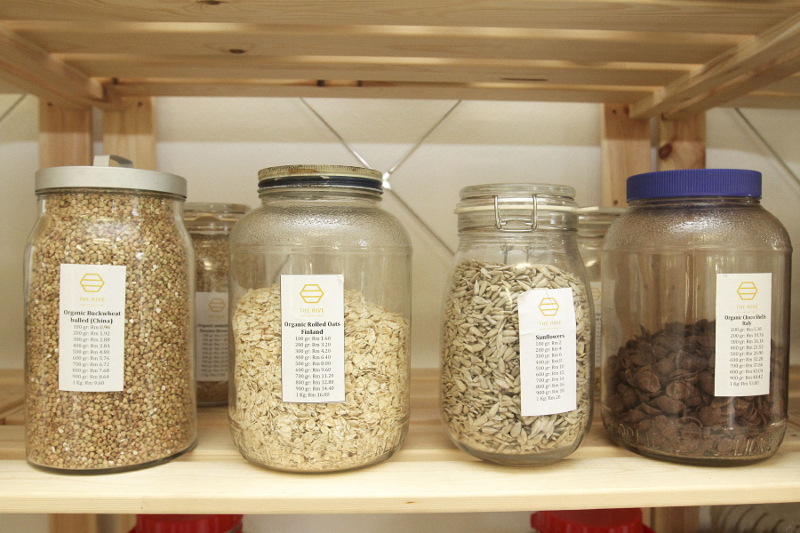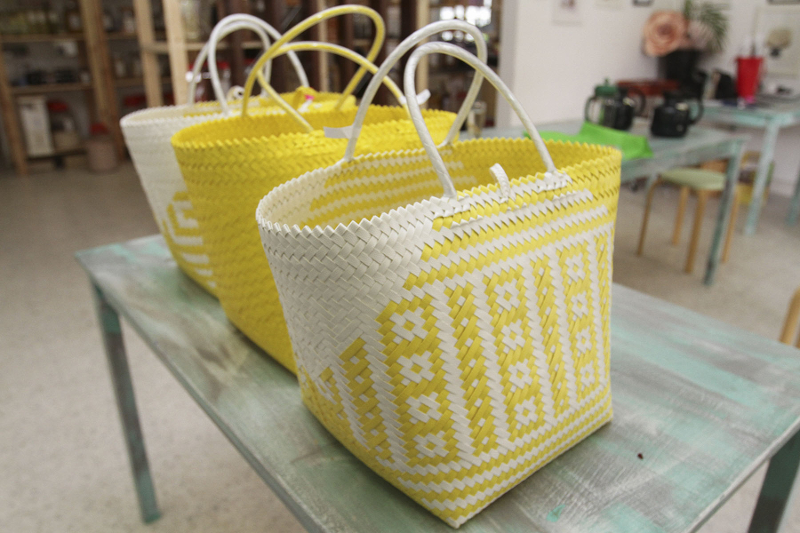KUALA LUMPUR, May 21 —If you are one of the small percentage of Malaysians who religiously separates your trash and recycles, you’re probably feeling pretty good about your efforts to save the environment.
But wait… you can still do more. Imagine buying food and products completely free of individual packaging and avoiding disposable items.
Well, a food co-operative in Bangsar called The Hive aims to get you to the next level i.e. zero waste living, by selling organic food and vegan products by weight.

Customers are expected to bring their own reusable packaging like containers when they shop here.
Beyond recycling, zero waste living means a lifestyle where zero (or close to zero) trash is produced, such as by using compostable toothbrushes, unpackaged soap and shampoo or reusable sanitary pads, buying unpackaged groceries and placing them in one’s own jars or containers and purchasing second-hand clothes, among others.
“Living zero waste is actually amazing, it’s so liberating,” The Hive founder Claire Sancelot told Malay Mail Online.
“You’re on a better diet, you’re automatically losing weight, because you don’t eat processed food.
“Packaged food is processed food, pretty much. So as soon as you have to cook your own food, you’re going to lose weight,” added the French woman who is married to a Malaysian.

The Hive, which was launched last October, also sells whole foods like seeds, nuts, grains, cereals, legumes, dried fruits, seasoning, spices, coffee, tea, spreads and vinegar (the jar can be returned for reuse); personal care products like bamboo toothbrushes and reusable sanitary pads; household products like stainless steel straws, biodegradable laundry powder and homemade natural cleaners; as well as bags and wheat free dog treats.

Sancelot said The Hive worked with Orang Asli and Semenyih organic farms that sell vegetables which customers can pick up at the co-operative, as well as with Burmese refugee women and Penan women who produce cloth makeup removers and handbags. All proceeds go back to them.
But a small commission is charged on products by Malaysian suppliers, who are primarily women whom Sancelot said she knows very well. A “little” extra revenue is earned through workshops, such as making natural skincare products like lip balm, and edible gardening.

“It’s all about empowering women,” Sancelot said. “Many of our clientele are women, so it’s women buying women’s products.”
Little cards depicting the supplier’s name, picture, company and product names hang on the display shelves.
“I like all my products to have a story and a meaning,” said Sancelot. “I know my distributors very well.”
The economist-turned-businesswoman expressed hopes of breaking even within a year, noting that The Hive is not a traditional Western co-operative.
She said co-operatives in Europe, for example, charge membership fees and they have a system of volunteers who run the store. Organic food would be cheaper at such co-operatives than in supermarkets.
“So maybe what happened in France in the 80s that started the co-operative, maybe in Malaysia… you may have it within a couple of years, it’s possible,” said Sancelot, who has two full-time volunteers helping out at The Hive.
For now, there is no membership fee at The Hive. She is running it with her own money and hopes to break even in a year. Hopefully, this will inspire other similar co-operatives in Malaysia.

How to live zero waste
Sancelot, who has twin girls aged five and a six-and-a-half-year-old daughter, practises a zero waste lifestyle and her family of five only produces enough trash to fit the size of a one litre UHT box in a week.
The average Malaysian reportedly produces 800 grams of solid waste daily, which translates to 28 kilogrammes a week for five people.
Sancelot said her children eat chicken twice a week, while she and her husband consume it much less frequently (they do not eat seafood or other types of meat).
Vegetables and free-range organic chicken and eggs are delivered to their house free of packaging as Sancelot packs them in her own containers; her reusable egg carton is three years old!
She, of course, does composting and has a vegetable garden too, where she grows brinjals, green beans, lettuce, sweet potatoes, Vietnamese mint and basil.
“We have our system; they love me,” Sancelot said. “Calvin is our delivery guy, he knows all my kids. This is the good thing about zero waste—you talk to your community, you talk to your suppliers.”
The 41-year-old said she also buys second-hand clothes and toys for her children from another family. Her own “capsule wardrobe” contains second-hand clothes that she buys from Hong Kong once a year, having spent a decade there, as well as new tees she purchases here once or twice a year.
Sancelot added that she is also minimalist in her make-up, possessing only two lipsticks (one dark and one light), two eyeshadows and blush.
She said she started practising zero waste living almost seven years ago after her first child was born.
“Once you have a child, you see the amount of trash, one plus one doesn’t equal two anymore,” said Sancelot. “The diapers, the wipes, the milk cartons, all the industries telling you things ‘you should buy for your baby to be safe and healthy’, which is not true obviously.”

Recycling, she said, was not the solution as not everything can be recycled, such as good-quality plastics that can only be recycled a few times.
“So I really believe in refuse first because recycling is very difficult, reduce second, reuse [third], recycling is only number four,” said Sancelot.
If zero waste living seems difficult, Sancelot suggested that one should start by composting and reducing meat consumption.
“You have to put your head into it and once you put your head into it, it’s not difficult, it’s actually kind of fun.”



















